Garage Door Monitor and Opener
Dependencies: X_NUCLEO_COMMON ST_INTERFACES
Introduction
This system implements a simple garage door opener and environmental monitor. The hardware connects to the internet using Wi-Fi then on to the Pelion Device Management Platform which provides device monitoring and secure firmware updates over the air (FOTA). Pelion Device Management provides a flexible set of REST APIs which we will use to communicate to a web application running on an EC-2 instance in AWS. The web application will serve a web page where we can monitor and control our garage..
This project is intended to work on the DISCO-L475VG-IOT01A from ST Microelectronics It implements a simple actuator to drive a relay to simulate pushing the "open" button on older style garage doors which do not use a rolling code interface.
The system is designed to be mounted over the door so that the on board time of flight sensor can be used to detect if the door is open or closed.
The system also monitors temperature, humidity and barometric pressure.
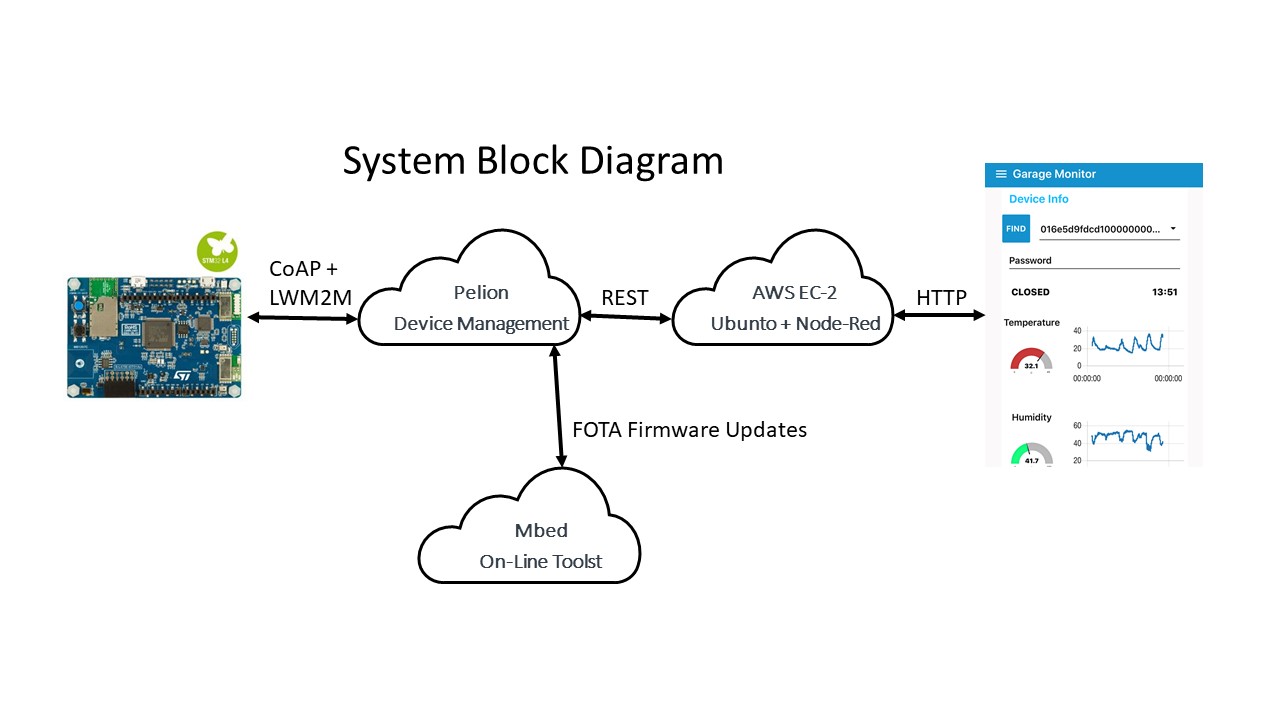
Hardware Requirements:
DISCO-L475G-IOT01A https://os.mbed.com/platforms/ST-Discovery-L475E-IOT01A/
Seeed Studio Grove Relay module https://www.seeedstudio.com/Grove-Relay.html
Seeed Studio Grove cable, I used this one: https://www.seeedstudio.com/Grove-4-pin-Male-Jumper-to-Grove-4-pin-Conversion-Cable-5-PCs-per-Pack.html
Connect to the PMOD connector like this:
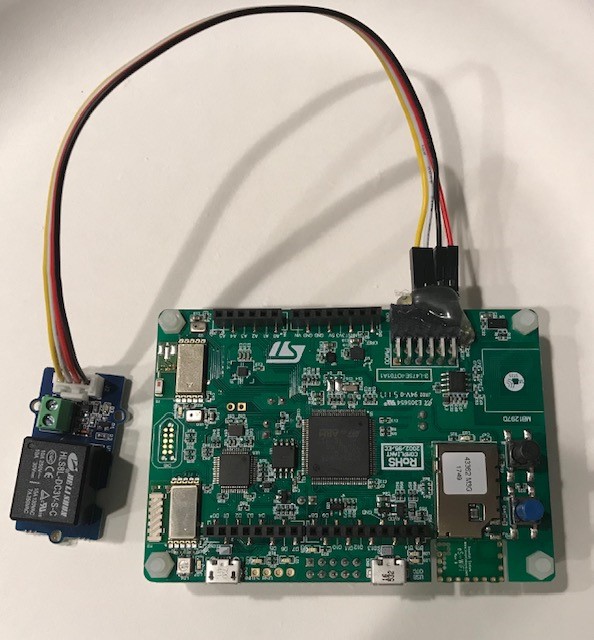
This shows how I installed so that the time of flight sensor can detect when the door is open
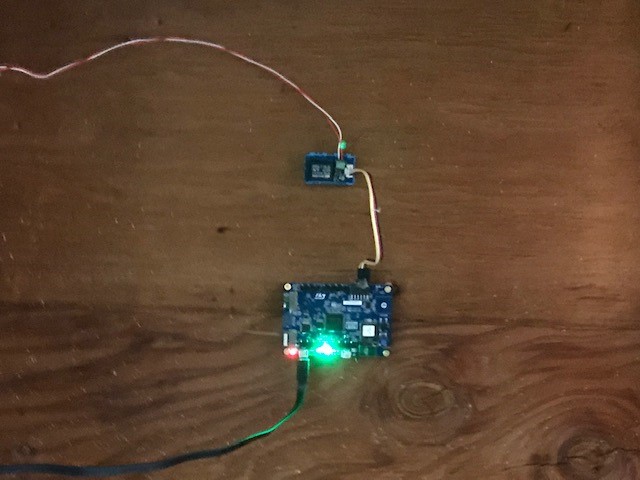
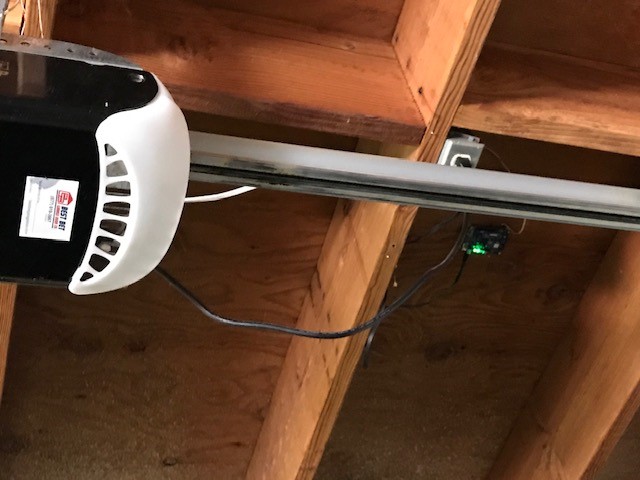
To use the project:
You will also need a Pelion developers account.
I suggest you first use the Pelion quick state to become familiar with Pelion Device Management. https://os.mbed.com/guides/connect-device-to-pelion/1/?board=ST-Discovery-L475E-IOT01A
Web Interface
For my web interface I am running node-red under Ubuntu in an EC2 instance on AWS. This can run for 12 month within the constraints of their free tier. Here is a tutorial: https://nodered.org/docs/getting-started/aws
You will also need to install several node-red add ons:
sudo npm install -g node-red-dashboard
sudo npm install -g node-red-contrib-mbed-cloud
sudo npm istall -g node-red-contrib-moment
After starting node-red import the contents of GarageFlow.txt from the project, pin the flow into the page.
To enable your web app to access your Pelion account you need an API key.
First you will neet to use your Pelion account to create an API key.
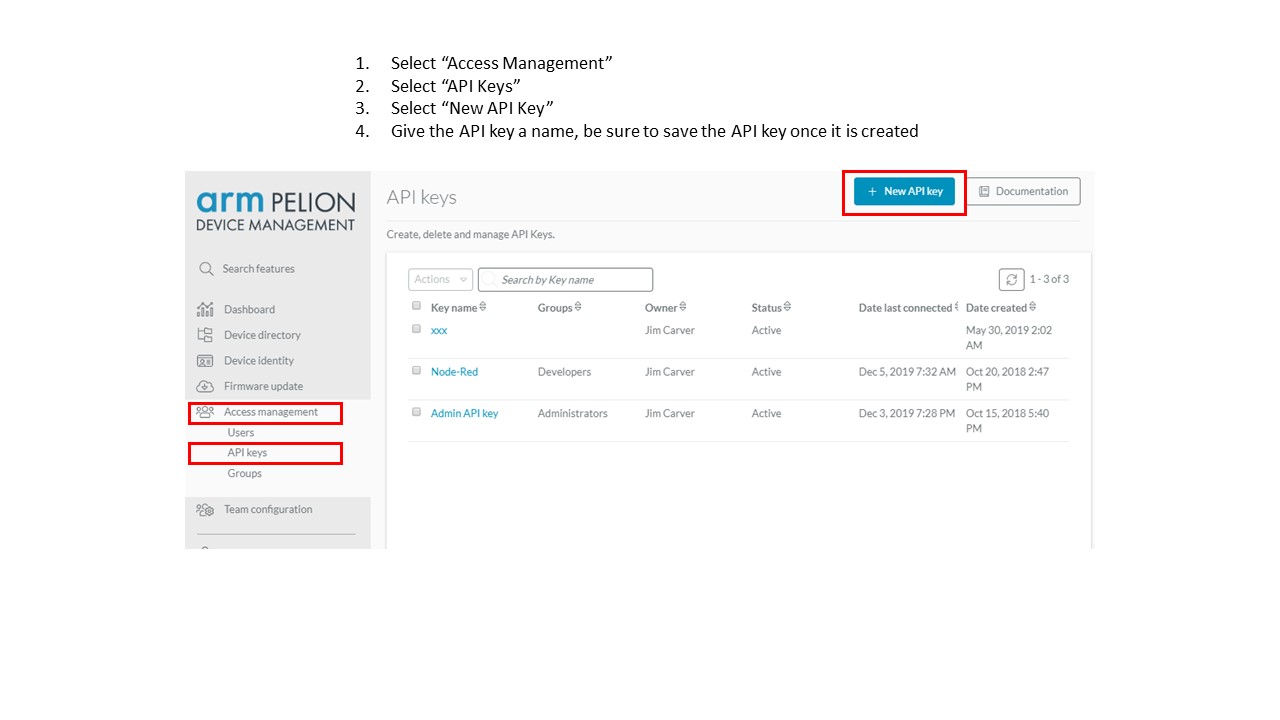
Now we need to apply that API key to your Node-Red flow.
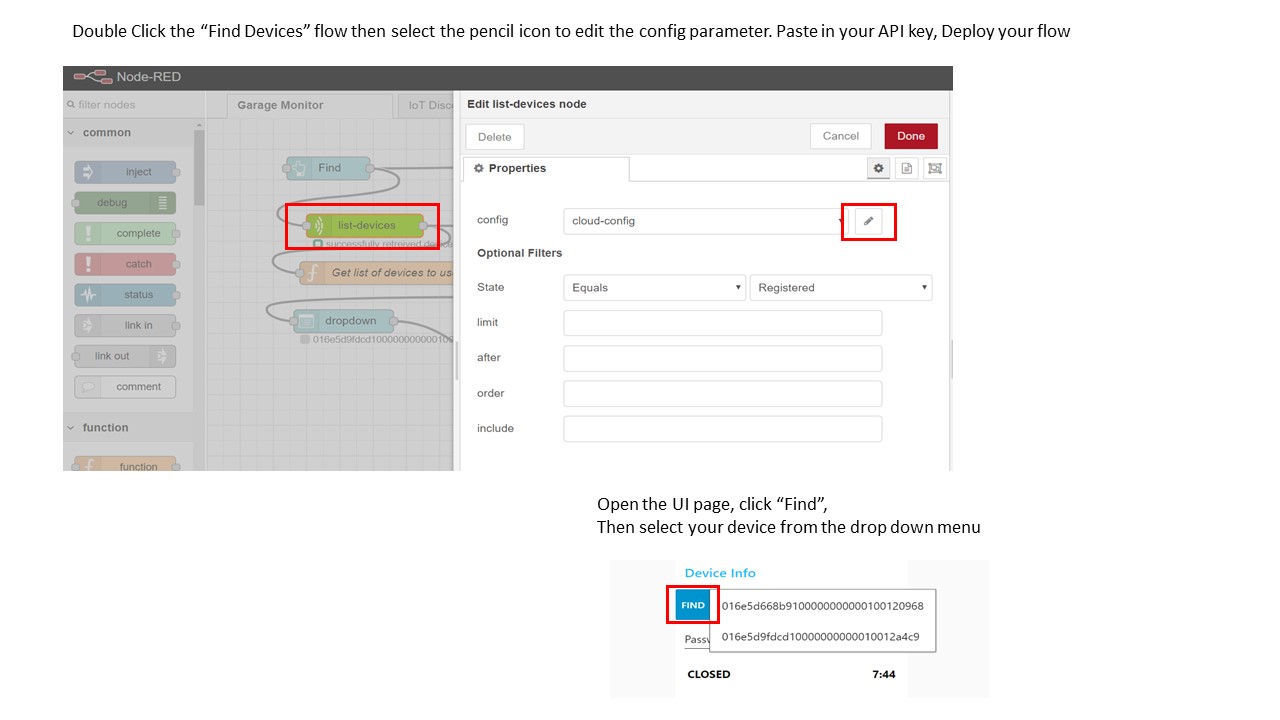
sensors/VL53L0X/VL53L0X_types.h
- Committer:
- JimCarver
- Date:
- 2019-12-05
- Revision:
- 37:ec1124e5ec1f
- Parent:
- 18:a15bfe7aaebd
File content as of revision 37:ec1124e5ec1f:
/*******************************************************************************
Copyright © 2015, STMicroelectronics International N.V.
All rights reserved.
Redistribution and use in source and binary forms, with or without
modification, are permitted provided that the following conditions are met:
* Redistributions of source code must retain the above copyright
notice, this list of conditions and the following disclaimer.
* Redistributions in binary form must reproduce the above copyright
notice, this list of conditions and the following disclaimer in the
documentation and/or other materials provided with the distribution.
* Neither the name of STMicroelectronics nor the
names of its contributors may be used to endorse or promote products
derived from this software without specific prior written permission.
THIS SOFTWARE IS PROVIDED BY THE COPYRIGHT HOLDERS AND CONTRIBUTORS "AS IS" AND
ANY EXPRESS OR IMPLIED WARRANTIES, INCLUDING, BUT NOT LIMITED TO, THE IMPLIED
WARRANTIES OF MERCHANTABILITY, FITNESS FOR A PARTICULAR PURPOSE, AND
NON-INFRINGEMENT OF INTELLECTUAL PROPERTY RIGHTS ARE DISCLAIMED.
IN NO EVENT SHALL STMICROELECTRONICS INTERNATIONAL N.V. BE LIABLE FOR ANY
DIRECT, INDIRECT, INCIDENTAL, SPECIAL, EXEMPLARY, OR CONSEQUENTIAL DAMAGES
(INCLUDING, BUT NOT LIMITED TO, PROCUREMENT OF SUBSTITUTE GOODS OR SERVICES;
LOSS OF USE, DATA, OR PROFITS; OR BUSINESS INTERRUPTION) HOWEVER CAUSED AND
ON ANY THEORY OF LIABILITY, WHETHER IN CONTRACT, STRICT LIABILITY, OR TORT
(INCLUDING NEGLIGENCE OR OTHERWISE) ARISING IN ANY WAY OUT OF THE USE OF THIS
SOFTWARE, EVEN IF ADVISED OF THE POSSIBILITY OF SUCH DAMAGE.
********************************************************************************/
/**
* @file vl53l0_types.h
* @brief VL53L0 types definition
*/
#ifndef VL53L0X_TYPES_H_
#define VL53L0X_TYPES_H_
/** @defgroup porting_type Basic type definition
* @ingroup VL53L0X_platform_group
*
* @brief file vl53l0_types.h files hold basic type definition that may requires porting
*
* contains type that must be defined for the platform\n
* when target platform and compiler provide stdint.h and stddef.h it is enough to include it.\n
* If stdint.h is not available review and adapt all signed and unsigned 8/16/32 bits basic types. \n
* If stddef.h is not available review and adapt NULL definition .
*/
#include <stdint.h>
#include <stddef.h>
#ifndef NULL
#error "Error NULL definition should be done. Please add required include "
#endif
#if ! defined(STDINT_H) && !defined(_GCC_STDINT_H) &&!defined(__STDINT_DECLS) && !defined(_GCC_WRAP_STDINT_H)
#pragma message("Please review type definition of STDINT define for your platform and add to list above ")
/*
* target platform do not provide stdint or use a different #define than above
* to avoid seeing the message below addapt the #define list above or implement
* all type and delete these pragma
*/
/** \ingroup VL53L0X_portingType_group
* @{
*/
typedef unsigned long long uint64_t;
/** @brief Typedef defining 32 bit unsigned int type.\n
* The developer should modify this to suit the platform being deployed.
*/
typedef unsigned int uint32_t;
/** @brief Typedef defining 32 bit int type.\n
* The developer should modify this to suit the platform being deployed.
*/
typedef int int32_t;
/** @brief Typedef defining 16 bit unsigned short type.\n
* The developer should modify this to suit the platform being deployed.
*/
typedef unsigned short uint16_t;
/** @brief Typedef defining 16 bit short type.\n
* The developer should modify this to suit the platform being deployed.
*/
typedef short int16_t;
/** @brief Typedef defining 8 bit unsigned char type.\n
* The developer should modify this to suit the platform being deployed.
*/
typedef unsigned char uint8_t;
/** @brief Typedef defining 8 bit char type.\n
* The developer should modify this to suit the platform being deployed.
*/
typedef signed char int8_t;
/** @} */
#endif /* _STDINT_H */
/** use where fractional values are expected
*
* Given a floating point value f it's .16 bit point is (int)(f*(1<<16))*/
typedef uint32_t FixPoint1616_t;
#endif /* VL53L0X_TYPES_H_ */